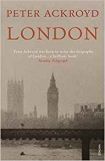Difference between revisions of "London: The Concise Biography by Peter Ackroyd"
| Line 1: | Line 1: | ||
| − | {{ | + | {{infobox1 |
|title=London: The Concise Biography | |title=London: The Concise Biography | ||
|author=Peter Ackroyd | |author=Peter Ackroyd | ||
| Line 11: | Line 11: | ||
|publisher=Vintage | |publisher=Vintage | ||
|date=April 2012 | |date=April 2012 | ||
| − | |||
| − | |||
| − | |||
| − | |||
|summary=An abridged, yet still substantial, version of Ackroyd's major 2000 'biography' of the capital, telling the story of how London evolved, in a series of thematic, almost chronological chapters. | |summary=An abridged, yet still substantial, version of Ackroyd's major 2000 'biography' of the capital, telling the story of how London evolved, in a series of thematic, almost chronological chapters. | ||
| + | |cover=0099570386 | ||
| + | |aznuk=0099570386 | ||
| + | |aznus=0099570386 | ||
}} | }} | ||
As is the case with his recent volume on Charles Dickens, Ackroyd's London is an abridged version of the full book originally published twelve years ago. Nevertheless, at over 600 pages of fairly close print in paperback, it is still a very full read. | As is the case with his recent volume on Charles Dickens, Ackroyd's London is an abridged version of the full book originally published twelve years ago. Nevertheless, at over 600 pages of fairly close print in paperback, it is still a very full read. | ||
Latest revision as of 13:37, 12 April 2018
| London: The Concise Biography by Peter Ackroyd | |
|
| |
| Category: History | |
| Reviewer: John Van der Kiste | |
| Summary: An abridged, yet still substantial, version of Ackroyd's major 2000 'biography' of the capital, telling the story of how London evolved, in a series of thematic, almost chronological chapters. | |
| Buy? Yes | Borrow? Yes |
| Pages: 661 | Date: April 2012 |
| Publisher: Vintage | |
| ISBN: 9780099570387 | |
|
| |
As is the case with his recent volume on Charles Dickens, Ackroyd's London is an abridged version of the full book originally published twelve years ago. Nevertheless, at over 600 pages of fairly close print in paperback, it is still a very full read.
Although the structure is chronological to a certain extent, it is not exactly a history of the city through the ages. I read it from start to finish, but it is the kind of volume which would lend itself equally to dipping into chapters at random. The author examines various aspects of life which make up the capital, such as fairs and pleasure gardens, great plagues and fires, sanitation and sewage, and eating houses down the ages. One moment he is examining how immigration has shaped it over the centuries and the consequences of various race riots, then he gives us an overview of crime, punishment prisons and murderers from Jack the Ripper to Dennis Nilsen, or how the authorities have treated the mentally ill – or 'the mad', as such people were mercilessly categorized in the days of the hospital at Bedlam.
From time to time he delves into more abstract themes. It is hardly surprising to find out that London produced more noise than any other part of the country, and that from its earliest days it rang with the hammers of artisans and the cries of tradesmen. In spite of this, a few pages later we read that on Sundays and public holidays, silence returns throughout the old City – though it is debatable as to whether this is as true in these days of longer shopping and licensing hours than it was around forty years ago. Nevertheless, to consider that the history of silence is one of London's great secrets opens up new avenues of thought on an aspect which might seem paradoxical in the centre of what we have long assumed is the world's largest and busiest city. Mapping it began in the seventeenth century, and the Ordnance Survey completed its work in 1850 in some 847 sheets. However Londoners and visitors had to wait until the 1930s for the fruit of the labours of Phyllis Pearsall, who would rise at 5 a.m. and walk 18 miles per day in order to complete the first edition of the A to Z Gazetteer which we probably take for granted today.
In a sense, nothing changes. We might consider that traffic congestion in London is one of the hazards of modern life. Not so - welcome to the sixteenth century, when there were complaints about the number of cars (no, not the modern automobile, naturally), drays, carts and coaches, and the inherent dangers to those who lived nearby. Thick fog is not generally welcomed by many these days, but when the French painter Claude Monet came to visit in 1899, it was specifically to capture the atmosphere on canvas; it is the fog that gives [London] its magnificent breadth.
It has always been a world of opposites, and doubtless will be. During the first century AD, there were about 30,000 inhabitants – soldiers, merchants, businessmen, artisans, artists, Celts and Romans. It was already the administrative and political capital of the country, as well as a place of execution and oppression, where the poor have always outnumbered the rich. Even in that century, it suffered severely from fires, epidemics, and war, when Boudicca and her army laid waste the city with flame and sword, the evidence of her destruction to be found in a red level of oxidized iron among a layer of burnt clay, wood and ash. The verdict that St Giles contained the seeds of revolution would be fulfilled when Bolshevism as a political party was founded in Tottenham Court Road with the Second Congress of the Russian Social Democratic Party in 1903. In medieval times, the high death rate was blamed partly on the lack of natural light, and in the fifteenth century lights were established by statutory decree, with every house beside the main thoroughfare being required to display a light at the Christmas watch. And while we may think of the place as being almost completely given over to buildings and roads, according to the latest Land Cover Map taken from the Landsat satellite, even today over a third of the total land area within the city boundaries is semi-natural or mown grass, tilled land and deciduous woodland.
Overall, the lesson from this book is that history is always repeating itself. For example, parallels are drawn between the savagery of the Gordon riots in 1780 and those in Brixton two centuries later, between the terrorist explosions that rocked parts of the city during the height of the Fenian agitation in mid-Victorian times and the bombings of 2005. What goes around comes around.
As I said above, even this abridgement is quite a hefty volume. It is packed with unexpected facts about a place which we tend to take for granted, about which we may feel we know everything and nothing. For anybody who lives there, or has done so (I did as a student for almost two years), or visits on a regular basis (as I do), it will be a very rewarding, not to say essential, read.
If this book appeals then you might like to try:
London Under by Peter Ackroyd
London: The Illustrated History by Cathy Ross and John Clark
Please share on: ![]() Facebook,
Facebook, ![]() Twitter and
Twitter and
![]() Instagram
Instagram
![]() You can read more book reviews or buy London: The Concise Biography by Peter Ackroyd at Amazon.co.uk Amazon currently charges £2.99 for standard delivery for orders under £20, over which delivery is free.
You can read more book reviews or buy London: The Concise Biography by Peter Ackroyd at Amazon.co.uk Amazon currently charges £2.99 for standard delivery for orders under £20, over which delivery is free.
![]() You can read more book reviews or buy London: The Concise Biography by Peter Ackroyd at Amazon.com.
You can read more book reviews or buy London: The Concise Biography by Peter Ackroyd at Amazon.com.
Comments
Like to comment on this review?
Just send us an email and we'll put the best up on the site.


